Parish History
The earliest Christians in Somerset can be traced back to the late Roman period. The existing house of secular priests was transformed into a Priory of Augustinian Canons by Bishop Giffard of Winchester in about 1115. Although there is relatively little known for certain about the early period of the foundation, there are some slightly later records giving the names of some of the Priors.
Priors of Taunton
Stephen, occurs 1159 . . . 1189
Robert, occurs 1197
John, occurs 1204
John, occurs 1313
Stephen de Pycoteston, died 1325
Ralph de Culmstok, elected 1326, resigned 1339
Robert de Messingham, elected 1339, died 1346
Thomas Cok or le Coke, elected 1346, occurs 1353
Thomas de Pederton, died 1362
Walter de Grateley, elected 1362, resigned 1377
John de Kyngesbury, elected 1378, died 1391
Walter Coke, elected 1391, died 1408
Robert Newton, elected 1408, died 1413
Thomas de Ufculme, elected 1413, occurs 1429
Thomas Benet, occurs 1438
Richard Glene or Gleve, occurs 1449, died 1476
John Asshe or Ayshent, elected 1476
John Prous or Prowse, elected 1492, resigned 1514, died 1519
Nicholas Peper, elected 1514, died 1523
William Yorke, nominated 1523
William Wyllyams or Andrewes, 1533–9
The priory was dissolved on 12 February 1539 and the Catholic faith in Somerset was then practiced in secret, with those sheltering priests risking martyrdom.
There are records of a couple of people being fined for recusancy in the 1590s, with the fine in each case being £240.
The first priest to take up residence in Taunton after the reformation was Fr George Baldwin or Baudwin who lived in East Street. He is thought to have come from this area originally and returned here after first ministering in Plymouth. Fr Baldwin initially celebrated Mass in his house in East Street as Catholic chapels were only permitted after 1791.
Missionary Rectors & Parish Priests of St George’s Church Taunton
Rev George Baldwin 1782 – 1818
Rev Samuel Bonaventure Fisher OSF 1818 – 1822
St George’s Chapel, The Crescent was opened on 3rd July 1822
Dom Richard Adrian Towers OSB 1822 – 1830
L’Abbé Pierre Chanteloup 1830 – 1833
Rev Andrew Byrne 1833 – 1834
Dom Richard Adrian Towers OSB 1834 – 1841
Rev John Fanning 1841 – 1848
Rev Henry O’Shea OSF 1848 – 1849
Rev John Fogarty 1849 – 1850
Rev John Fanning 1850 – 1853
St George’s Church, Billet Street was opened on 24th April 1860
Rev Canon John Mitchell 1853 – 1899
Rev Canon Daniel Iles 1899 – 1902
Rev George William Bailey 1902 – 1911
St George’s Church was consecrated on 23rd April 1912
Rev Canon James O’Shaughnessy 1911 – 1927
Rev Mgr Provost Richard Iles 1927 – 1967
Rev Mgr Provost Patrick Lynch 1967 – 2000
Rev Canon John Cunningham 2000 – 2012
Rev David Mills 2012 – 2015
Rev Canon Alan Finley 2015 – 2017
Rev Mgr Bernard Massey 2017 – 2021
Rev Thomas Dubois 2021 –
War memorials at St George’s
There are two memorials at St George’s, commemorating the parishioners who died in the First and Second World War respectively. Ray Stokes has produced a moving booklet giving details of these men, which is available for download here.
St. John Fisher, Wellington
From the early to mid-seventeenth century a recusant family, the Porters, lived at Old Court, Mantle Street. Through the English Mission in Rome, they secured the services of Fr. James Jenison S.J. officially known as the gardener and handyman, if soldiers came looking for priests, he would escape via a tunnel under what is now the town’s playing field, to re-emerge in Home Farm (now the Court Nursing Home) in his gardener’s clothes. No further Catholic priests served in Wellington until 1941. Before the present church opened Mass was celebrated in the former town hall by a priest from Taunton. Taunton’s Catholic community collected money for a Wellington mission from about the mid-1930s.
In 1936 the Popham Almshouses were vacated, the residents being moved to a new site in Victoria Street. It was bought by the Catholic community and converted to form the present church. The architect responsible for the conversion, John Willman, reportedly did the work free of charge. The church was opened by Bishop Lee in March 1937 and certified as a place of meeting for religious worship 26 November 1940.
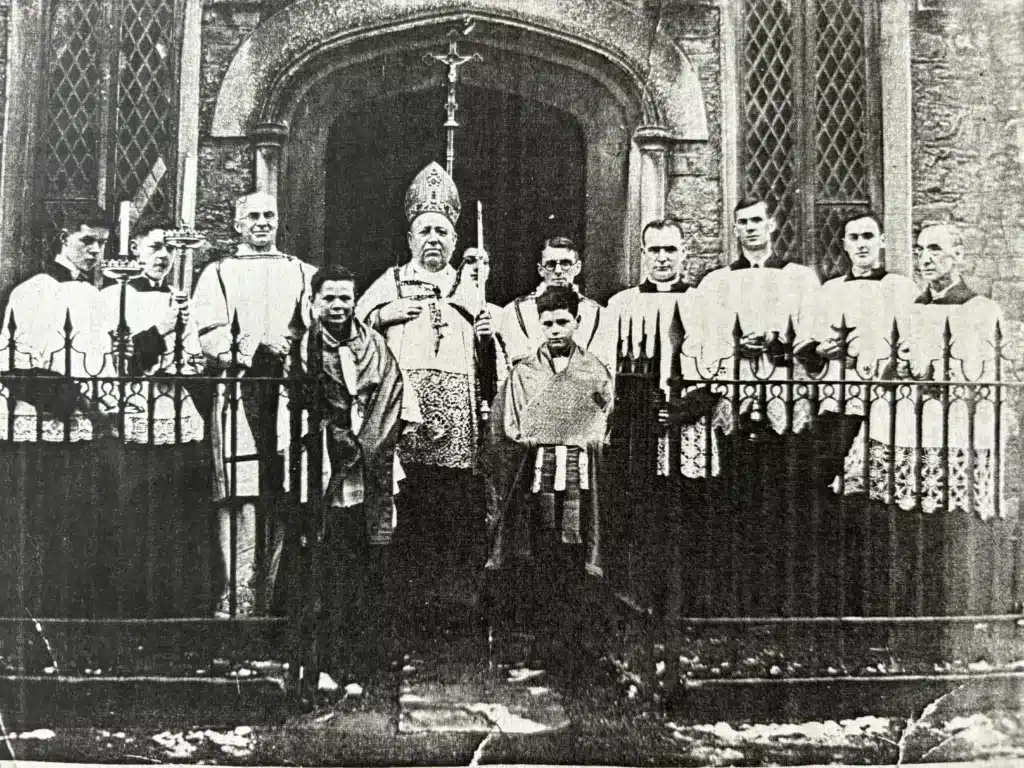
The opening of St John Fisher’s, March 1937, by Bishop William Lee of Clifton.
The two boy servers were from Wellington. Their names, and the person standing behind the candle held by the bishop have not been identified. The others, all from St George’s, Taunton, are (left to right): Jeff Hartnell, Pat Hartnell, Canon Richard Iles (parish priest, St George’s, c.1930-1967), Canon Louis McEnery, Fr Foran, Jeff Fooks, Jack Hill, Mr Smith. The candlesticks and processional cross were borrowed from St George’s for the occasion. Note the lingering snow, even in early March; winters were colder then!
Mass celebrated by Bishop Rudderham.
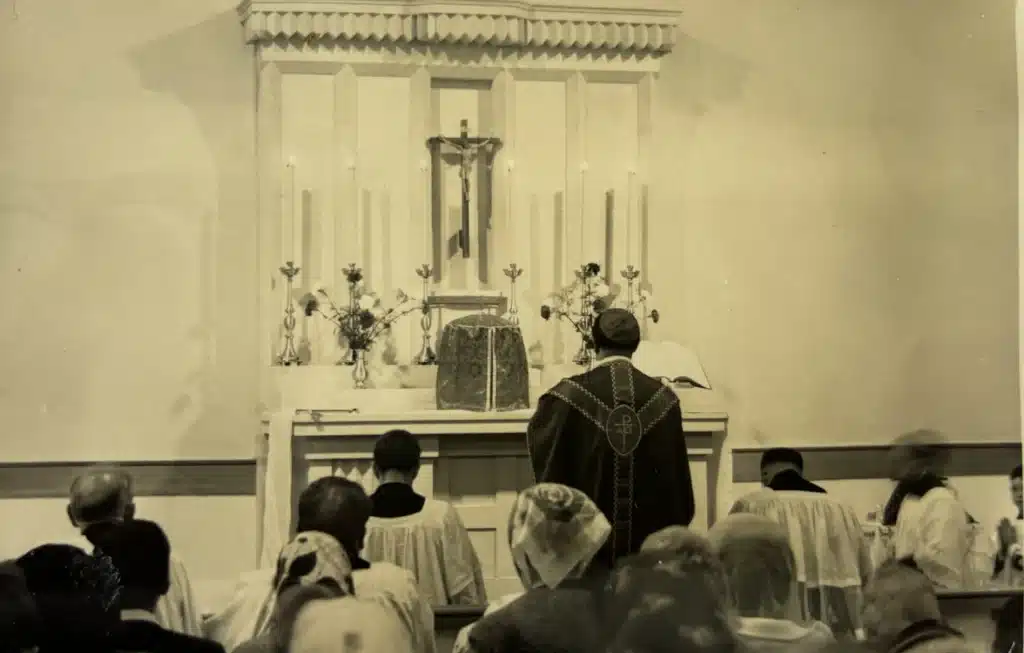
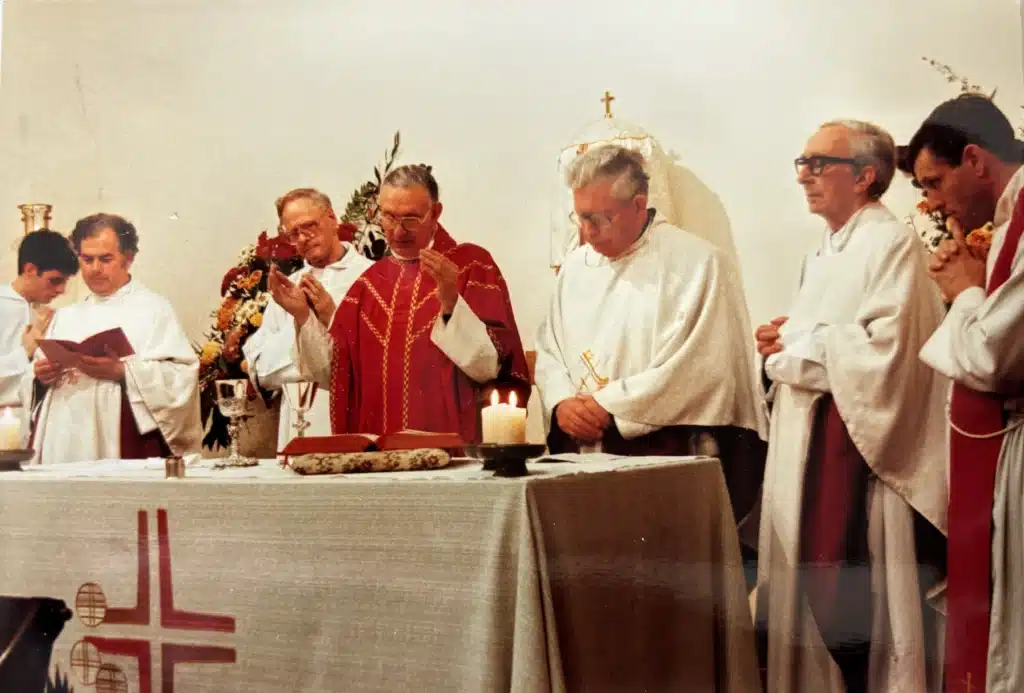
Bishop Mervyn Alexander concelebrates a confirmation mass with (left to right), Fr Richard Northey (parish priest), Deacon Bob Cornell, Canon Patrick Lynch, Fr Philip Caraman SJ (Dulverton) and Fr Jeremy Rigden (bishop’s secretary). The server in the background, was studying for the priesthood at the time, and is now a priest of the Diocese, Fr Gary Brassington.
The church occupies the site of the original building planned as an almshouse by the foundation of Sir John Popham, Lord Chief Justice of England, in 1594 (Popham owned a large mansion nearby). The original almshouse was built about 1606, and rebuilt in 1833, apparently to a design inspired by old Blundells School, Tiverton. About 1964 considerable restoration work was carried out on the main buildings. These included the removal of the chimneys and the creation of the parish room. In 1990 major repairs were carried out to the roof and this was followed in 1996 by the installation of a new ceiling. The roof repairs were paid for with part of a generous bequest by a parishioner, the late Mary Morris.
From 1937-1941 St. John Fisher was served from Taunton. The parish priest at Taunton for some forty years (1927 to 1967) was Mgr. Provost Richard lies.
The first priest in charge at Wellington was Fr. Ninian O’Connor, however, in the interim, visiting priests included Fr. Francis Kelly S.J. who officiated at the first marriage in the church, 25 November 1941.
Cothay Manor
No history of St. John Fisher parish would be complete without a reference to Cothay Manor, near the village of Greenham. Once described as ‘the most perfect small fifteenth century house that survives in the Kingdom’, it was owned from 1947 to 1972 by Mrs. Vera Astley-Rushton, whose husband was a descendant of the original feudal overlord of Cothay. She was the first Catholic to live there since the Bluetts in 1588. Mrs. Aston-Rushton opened an oratory and the first Catholic Mass since the reformation was celebrated there by Archbishop Thomas Roberts S.J. in 1953. For a number of years the house was the venue for days of recollection, and a number of well-known priests held days there including Arch¬bishop Roberts, Mgr. Vernon Johnson, Rev. Alfonso Zulueta and others. Cothay was also the venue for the parish’s annual Corpus Christi procession from 1956 until 1968.
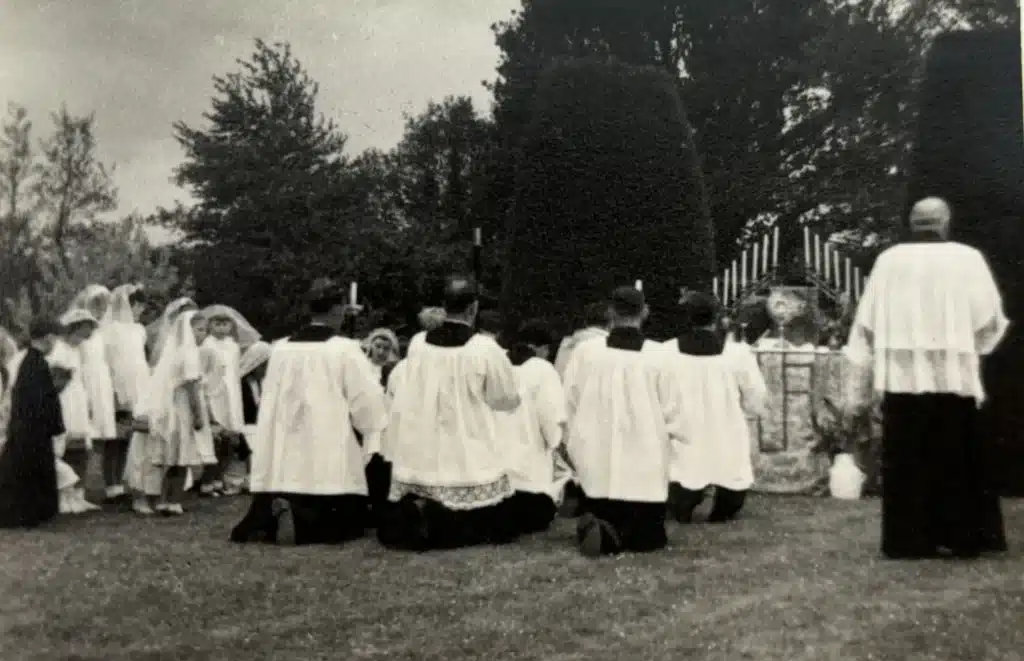
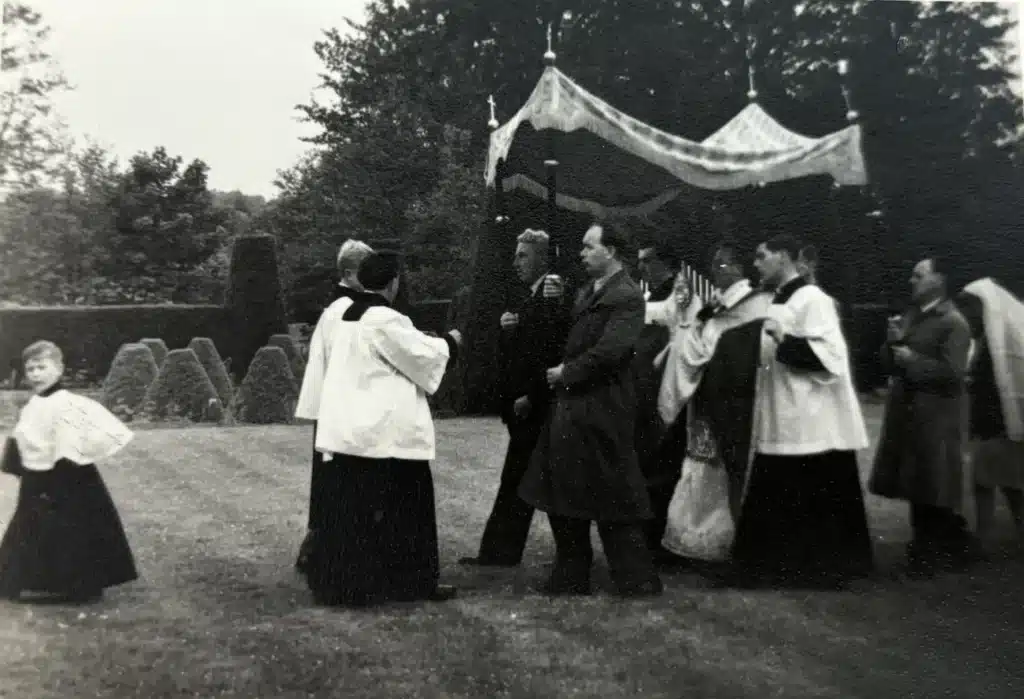
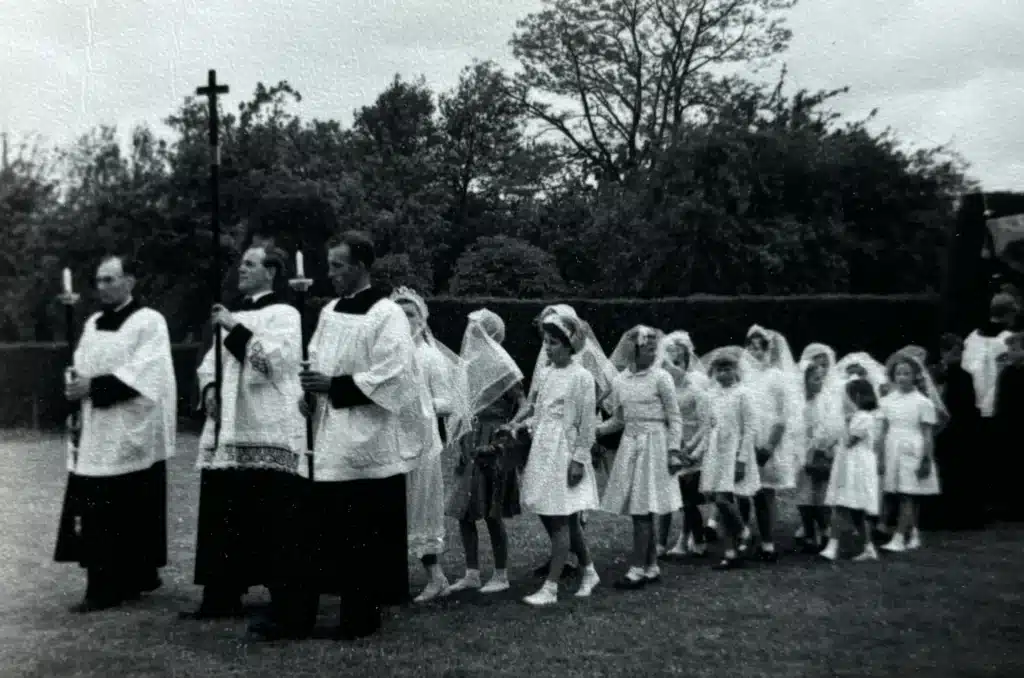
Another notable venue in the parish was Bindon House, near the village of Langford Budville. As St. Monica’s Priory, it was the Assumptionist novitiate from 1947 until about 1950. Bindon was a former grange of the pre-¬Reformation Minchin Buckland Priory, Durston (originally founded as an Augustinian house).
St. Richard, Wiveliscombe
Catholics originally met wherever they could find an available room. This reputedly included hired rooms in local public houses, and for a while, a room in the town hall chambers. A mission was started there by Bishop Lee in 1942, the priest serving the community being Fr. (later Canon) Ronald McDonald. A church dedicated to St. Richard was opened above a shop in Silver Street on 26 July in that year with the priest living in the adjoining house. In 1953 an architect’s and surveyor’s report mentioned the poor state of both church and presbytery, and the poor condition of the church was again raised in 1960. At some point around this time concern about the strength of the floor led to the church being moved from the first floor to the ground floor to occupy what is now a newsagent’s shop. News that the buildings might have to be demolished for road widening gave the parish the incentive to look for a new site. Parishioners therefore set about raising the money for a new building. At this time the diocese owned a site of one and a half acres, but this was zoned for industrial use. In 1965 outline planning permission was granted for this land to be developed industrially, and the following year the diocese sold part of it for £2,300.
Meanwhile a possible venue was found at 34 Church Street. This comprised a detached house, and an adjoining property belonging to B.J. Langdon and Sons, egg and poultry packers, which could be demolished. Negotiations resulted in a price of £8,000. The new church was opened by Bishop Rudderham in 1967. During the intervening period Mass was held in the house, which had become the presbytery.
On the retirement of Fr. Henry Formosa, in 1973, St. Richard’s became the responsibility of the parish priest at Wellington. The following year the presbytery was sold for £ 14,000. Also at this time some land at the front of the property was sold for road widening. One resulting quirk of history was that St. Richard’s (until recently) never benefited from a mains water supply. When Fr. Formosa lived next door the expense of piping water to the church was seen as unnecessary, as it could be obtained so easily from the presbytery. After the sale of the house this left the problem of water having to be imported for services and other functions – a disadvantage that was not rectified until 2000.
Catholic Priests who have served in Wellington
? – 1636 Fr John Salkeld (last official priest although Fr James Jenison operated under cover for the Porter family)
No RC. priest then served Wellington until:
1937 – 1941 Served from St George’s Taunton
1941 – 1943 Fr Ninian O’Connor
1943 – 1949 Fr Joseph Sheehan
1949 – 1951 Fr Bartholomew Collins
1952 – 1957 Fr Thomas Walshe
1957 – 1962 Fr Francis Meegan
1962 – 1966 Fr Jeremiah O’Brien
1966 – 1968 Fr Timothy Barry
1968 – 1977 Fr William Dee
1977 – 1978 Fr James Byrne
1978 – 1982 Fr William Dee
1982 – 1987 Fr Kevin Mortimer
1987 – 1995 Fr Richard Northey
1995 – 1998 Fr Bosco Macdonald
1998 – 2005 Fr Bernard Shackleton
2005 – 2010 Fr Bob Rainbow
2010 -2016 Fr Vincent Curtis
2016 -2021 Fr Ikeokwu Nduh MSP
2021-2021 Msgr Bernard Massey
2021 – Fr Tom Dubois
